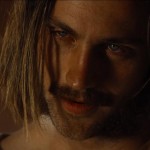Anyone over 60 might remember the American character actor and singer Divine for his outrageous, satirical drag-queen roles in John Waters’ films Mondo Trasho (1969) Pink Flamingos (1972), Female Trouble (1974), Polyester (1981) and Hairspray (1988). But as Jeffrey Schwarz’s entertaining documentary, I AM DIVINE reveals, there’s a lot about Divine we have forgotten or never appreciated or never knew, including the extent of his admirable work ethic and, according to many, his talent.
Few of us know that Harris Glenn Milstead, an only child, was born, in 1945, into a loving, middle-class family in Baltimore, Maryland, where he was bullied at school and preferred styling women’s hair, to going out. He also preferred stuffing his face to exercising, a preference that cost him his life at 42.
From a young age Glenn was thoughtful and very generous, but, at that age, not with his own money. Glenn was such a good liar that when the police gave him a lie detector test, he passed it. He dated Diana Evans between 1959 and 1965, although it seems that he loved to do her hair and choose her wardrobe more than anything else. In 1962, Glen met his neighbour, the aspiring filmmaker John Waters. Waters not only encouraged Glen to go out (and ‘come out’), but in a very early 1960’s film, The Roman Candles, gave Divine the stage name that stuck.
Waters saw Glenn’s potential and the two men’s careers rose together. Despite this, Waters did not hold Glenn back when, in 1975, he headed to NYC to pursue theatre, collaborating with playwright Tom Eyen on Women Behind Bars and a sequel, produced in San Francisco, The Neon Woman. Women Behind Bars was such a success that celebrities from all over, including David Bowie, Rudolph Nureyev and Elton John came to see it. Divine was the celebrity guest at the opening of New York’s iconic Studio 54, a night club that defined the decade.
Glen was excessive in everything he did. From marijuana, to food, to make-up, to spending money on friends and to a gruelling musical touring schedule under manager Bernard Jay, his life was one of excess.
When Glen began impersonating a drag-queen in Waters’ films, his conservative parents disowned him, a long rift that was tenderly healed by the time Divine invited his mother to the premiere of Hairspray. There are photos of her standing proudly next to Glen after watching him playing a housewife and mother to an overweight child (Ricki Lake).
Even the legendary New Yorker film critic, Pauline Kael, gave Divine a positive review for Hairspray, on the back of which he landed a job – playing a man – on a television series. He never made it to the first day’s shooting in 1988, however, having suffered a fatal heart attack the night before.
The wonderful clips are alternated with interesting on screen recollections from Waters, Holly Woodlawn and Mink Stole (from the San Francisco-based The Cockettes); Tab Hunter (Glenn’s childhood idle with whom she starred in two films), personal assistant Jay Bennett, and his mother, Frances, who passed away just before the film’s completion.
Divine’s success was due not only to Waters and Bernard Jay, but to Van Smith’s costumes and unique face make-up, and, of course, to his showmanship, daring and originality. Divine loved entertaining and, late in life, achieved his goal of being taken seriously as male actor. We can only speculate where the television series would have taken him, because it is clear that he could not return to drag-queens or musical tours. It was both a tragedy and, perhaps, a blessing that he died having been recently reunited with his family and having reached what was arguably, the peak of his career.
Joyce Glasser – MT film reviewer




